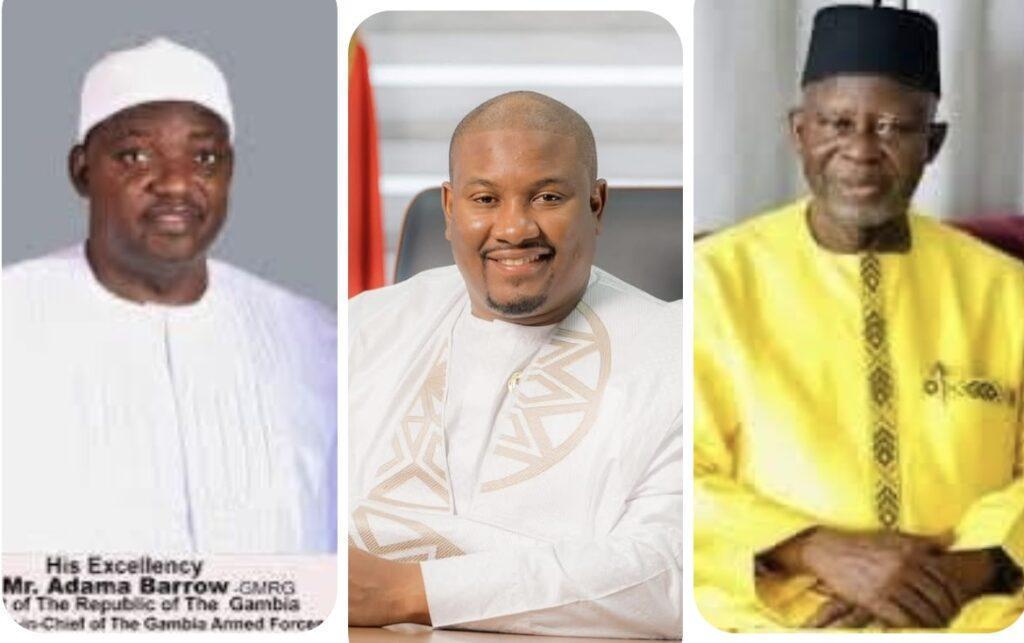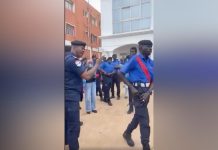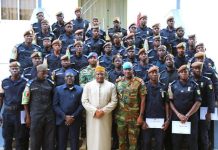Africa-Press – Gambia. A new nationwide opinion poll commissioned by Gambia Participates and conducted by CepRass has provided one of the most comprehensive snapshots yet of voter sentiment ahead of the 2026 presidential election, revealing deep public skepticism toward both incumbent President Adama Barrow and veteran opposition leader Ousainu ANM Darboe, while highlighting growing interest in younger figures such as Talib Bensouda.
The survey, conducted in July 2025, covered all 53 constituencies and eight Local Government Areas (LGAs), interviewing 1,556 Gambian adults aged 18 and above. Using stratified random sampling and face-to-face digital interviews, the poll offers robust insight into the political climate, with less than 18 months before Gambians head to the polls.
Public Sentiment on President Barrow
A majority of respondents—55%—believe President Barrow should not contest for a third term in 2026. Only 35% support the idea, with 10% undecided. When asked if they would vote for him, rejection was even starker: 60% said they would not, compared to just 19% who would, with the remaining 20% unsure.
Barrow’s strongest backing comes from Basse, where 56% of voters expressed willingness to support him, followed by Kanifing with 48%. However, opposition dominates in strategic regions such as Banjul, Kerewan, Brikama, and Kuntaur, where majorities say they would not back his candidacy.
The poll also highlights a clear generational gap. Voters aged 25–44 are the most opposed, with rejection rates twice as high as support. Among the youngest voters (18–24), opposition softens but still outweighs support. By gender, Barrow faces steeper rejection from men (38%) than women (22%), though in both groups disapproval significantly exceeds endorsement.
Ousainu Darboe’s Prospects
Veteran opposition leader Ousainou Darboe, head of the United Democratic Party (UDP), fares no better. Nationally, 58% of respondents said Darboe should not contest, compared to 28% who supported his bid and 13% were undecided. When asked if they would vote for him, only 18% expressed willingness, while 63% said they would not.
Darboe’s strongest support appears in Mansakonko, Kerewan, and Janjanbureh, while rejection is sharpest in Kanifing and Brikama. Gender and age differences for Darboe mirror Barrow’s challenges: men show higher opposition than women, and younger voters are more dismissive than older generations.
UDP Succession and the Rise of Talib Bensouda
The poll shows Talib Bensouda, Mayor of Kanifing, as the overwhelming favorite to succeed Ousainu Darboe, with 44% of respondents endorsing Bensouda as the party’s next presidential candidate. Yankuba Darboe trails far behind at 13%, while Rohey Malick Lowe garners only 5%.
Notably, 50% of Gambians believe Bensouda should run for president regardless of party affiliation, underscoring his cross-party appeal. His strongest support comes from Kuntaur, Basse, and Banjul, though urban centers such as Brikama and Kanifing show weaker backing.
Support for Bensouda is especially pronounced among voters aged 25–34, positioning him as the preferred choice of younger and middle-aged Gambians. Men show stronger enthusiasm (31%) than women (19%), though a high proportion of undecided voters indicates that his base is not yet fully consolidated.
Coalition Politics: A Decisive Factor
The survey underscores the potential importance of coalition-building in 2026. Fifty-five percent of respondents believe a coalition featuring Bensouda, former TRRC lead counsel Essa Mbaye Faal, and GDC leader Mama Kandeh could win the presidency. Only 16% disagreed, while 29% remained uncertain.
If such a coalition were formed, Bensouda emerges as the preferred leader with 38% support, followed by Mama Kandeh (14%) and Essa Mbaye Faal (12%). Yet, a striking 33% of respondents remain undecided, reflecting the fluidity of coalition politics.
Perceived Frontrunners for 2026
When asked who currently stands the best chance of winning in 2026, 31% of respondents chose President Barrow, followed by Talib Bensouda at 18%, and Ousainou Darboe at 12%. Essa Mbaye Faal and Mama Kandeh each received 3%, while nearly a third of Gambians (29%) remain undecided.
Regional breakdowns reveal a fragmented landscape. While Barrow maintains a lead nationally, he is not leading in any of the regions. Banjul, Kuntaur, and Kerewan voters lean toward Bensouda, Basse favors Mama Kandeh, Mansakonko, and Janjanbureh identify Darboe as the frontrunner. These divergences suggest that regional alliances and campaign strategies will play a critical role in determining the election outcome.
Key Takeaways
Both Barrow and Darboe face strong public resistance, signaling widespread appetite for change.
Talib Bensouda is emerging as the strongest alternative, with significant cross-party support, particularly among youth and men.
Coalition politics could prove decisive, with a majority of Gambians open to a unified opposition ticket.
The high proportion of undecided voters (nearly 30%) underscores that the race remains volatile and highly competitive.
As The Gambia moves toward one of the most consequential elections in its history, the poll highlights a shifting political terrain: skepticism toward the old guard, cautious optimism for younger leaders, and widespread recognition that coalition-building may hold the key to victory in 2026.
Source: Kerr Fatou Online Media House
For More News And Analysis About Gambia Follow Africa-Press






